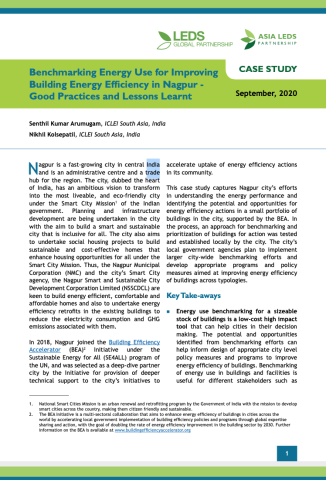
This case study captures Nagpur city’s efforts in understanding the energy performance and identifying the potential and opportunities for energy efficiency actions. An approach for benchmarking and prioritization of buildings for action was tested and established by the city. The program was supported by the Building Efficiency Accelerator (BEA) Initiative under Sustainable Energy for All (SE4ALL).
Energy use benchmarking for buildings is a low-cost high impact tool that can help cities in their decision making. It benefits local government authorities, property owners, facility operators, managers, and designers as it facilitates energy accounting, assessing opportunities for improvement, and quantifying or verifying energy savings. Securing buy-in from leadership and stakeholder engagement are critical elements of a successful benchmarking effort. Energy benchmarking requires collection of information on building energy consumption, floor area, building occupancy, operating hours, and connected electrical load. In the case of Nagpur, working with the local electricity utility or energy service provider helped collect time-series energy consumption data. Cities should strengthen their data ecosystem through building energy disclosure laws or through effective stakeholder engagement that enables cooperation for data sharing and implementation of energy efficiency actions.
The study finds that for public offices, energy performance increases with connected load. In public office buildings, lighting, ceiling and exhaust fans, and air coolers were the major contributors to the connected load of the buildings. Low cost energy efficiency measures were found to have potential energy savings of about 10 to 30 percent, with investments as low as INR 20,000 to INR 125,000 (USD 272 to USD 1,705). Energy performance of hotels increased with the hotel size and with hotel service/star rating. While unrated economy hotels can achieve up to 10 percent of energy savings with an investment of under INR 100,000 (USD 1364), star rated hotels need higher investments to achieve significant energy savings.



